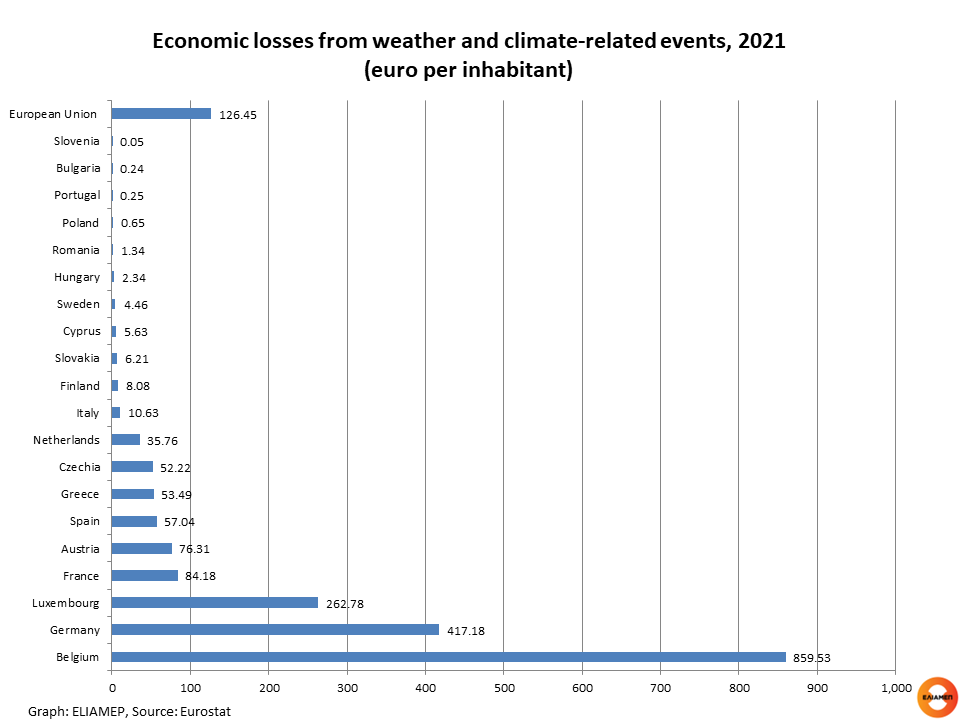Climate change makes EU countries increasingly vulnerable to natural disasters as it leads to extreme weather events such as high temperatures, heavy rainfall and droughts that threaten human life and the environment. At the same time, they cause significant economic losses as they damage property and public infrastructure and affect economic activity in various sectors such as agricultural production, aquaculture, tourism, etc. In total, heat waves, floods and storms have caused economic losses that exceed €200 billion across the EU from 2010 to 2021.
Climate related economic losses vary over time. During some years economic losses related to weather and climate were lower for the EU as a whole (e.g. in 2012 it was around €3.8 billion) while in other years total loss was particularly high (e.g. in 2017 economic losses exceeded €28 billion as a result of the heat waves registered in Europe that dried the land and caused wildfire conditions). Although there is high variability, research suggests that climate-related economic losses are increasing over time.
In 2021 (the last year with available data) weather and climate-related losses increased significantly to €56.5 billion, from €12.4 billion in 2020. The reason for the vast increase in economic losses is the devastating floods that mainly affected Belgium and Germany but also due to the wild fires of the Mediterranean countries. In particular, Belgium recorded the highest climate-related economic losses (€860 per inhabitant), while Germany was in second place (€417 per inhabitant). Luxembourg, which was also affected by the floods, was in third place (€263 per inhabitant). It was followed by France (€84 per inhabitant), Austria (€76 per inhabitant) and Spain (€57 per inhabitant).
The wildfires of Evia and other areas of Greece in August 2021 placed our country in 7th place, with economic losses reaching 53.5 euro per inhabitant. It is worth noting that in 2020, Greece recorded the highest climate-related economic losses in the EU (€91.7 per inhabitant compared to €27.8 per inhabitant which was the European average). Finally, the lowest losses per inhabitant for 2021 were recorded in Slovenia (€0.05 per inhabitant), Bulgaria and Portugal (€0.25 per inhabitant) while no data are available for Denmark, Malta, Latvia, Estonia, Lithuania, Ireland and Croatia.
The Intergovernmental Panel on Climate Change predicts that climate-related extreme weather events will become more frequent and more severe. This summer, just in 12 days (15/07-27/07) 135,000 hectares of land were burned in the Mediterranean region (Tunisia, Algeria, Greece, and Italy). Over 50,000 of these hectares are in our country.
The effects of climate change are expected to continue for decades, even if global and European efforts to cut greenhouse gas emissions prove effective. The future cost of climate-related damage depends not only on the frequency and severity of climate and weather extremes but also on government measures to manage the risks associated with climate change (such as flood defense, developing drought-resistant crops, developing forestry practices less vulnerable to storms and fires, etc.). Thus, European governments should not focus on restoring damaged infrastructure, but above all they should to act proactively to limit – wherever possible- the impact of these events. The new EU climate change adaptation strategy, the Recovery and Resilience Facility and the Cohesion Policy funds represent a historic opportunities for investments that can significantly contribute to the reduction of the cost of climate-related disasters.




